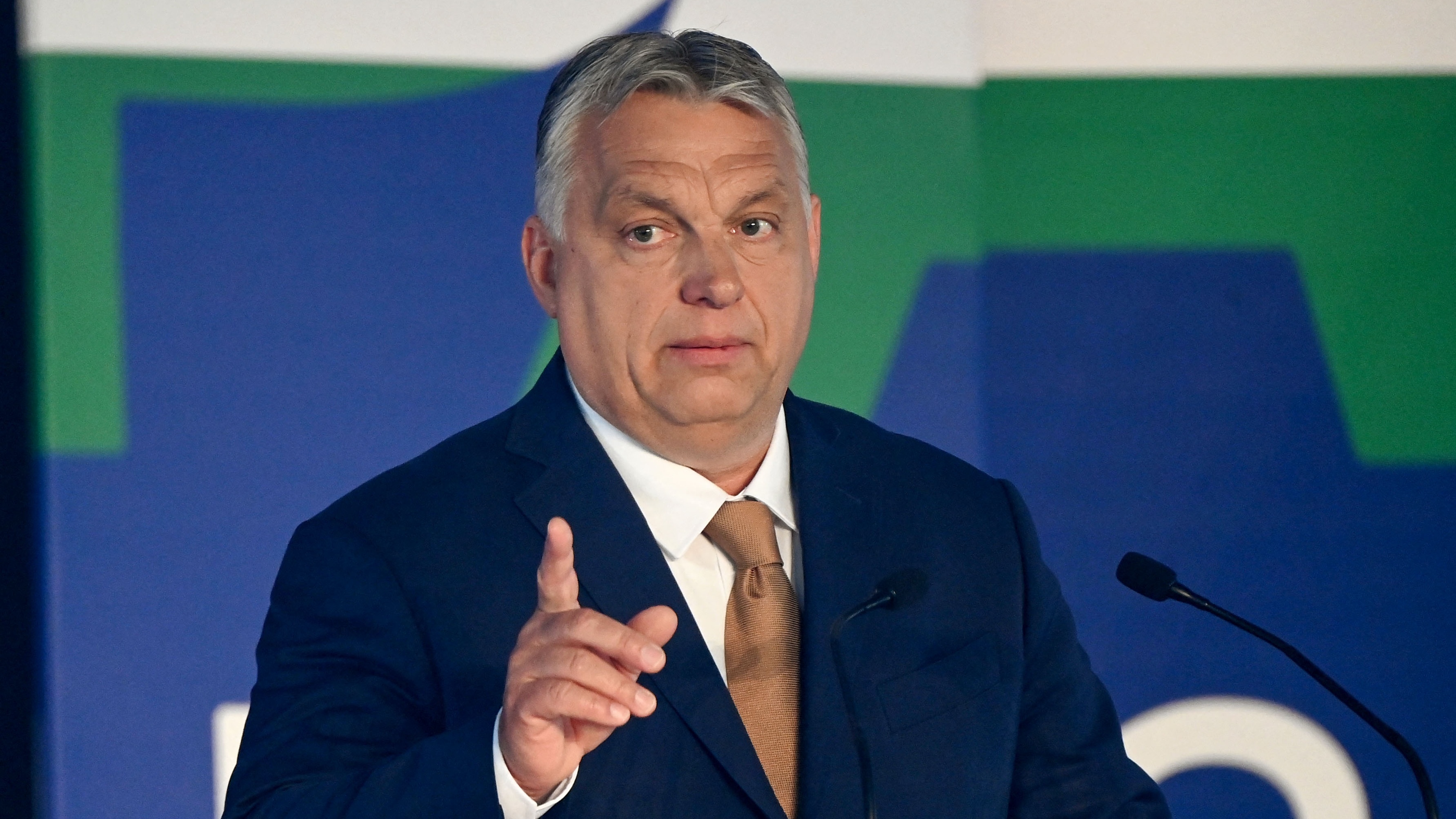Why has Viktor Orbán declared a state of emergency over Ukraine?
Hungary ends Covid crisis measures – and ushers in new ones over Russia’s invasion

A free daily email with the biggest news stories of the day – and the best features from TheWeek.com
You are now subscribed
Your newsletter sign-up was successful
Viktor Orbán has declared a state of emergency in Hungary, introducing a wide-ranging windfall tax to combat a cost-of-living crisis triggered by the war in Ukraine.
The newly re-elected prime minister told MPs that the measures would give him the power to respond with “real guts” to the looming crisis. But he “resisted blaming” the emergency on his previously “close ally” Vladimir Putin, The Times said.
“The years between 2020 and 2030 will be a decade of dangers, uncertainty and war,” Orbán said.
The Week
Escape your echo chamber. Get the facts behind the news, plus analysis from multiple perspectives.

Sign up for The Week's Free Newsletters
From our morning news briefing to a weekly Good News Newsletter, get the best of The Week delivered directly to your inbox.
From our morning news briefing to a weekly Good News Newsletter, get the best of The Week delivered directly to your inbox.
“In such an era, Hungary cannot afford the luxury of irresponsibility, disunity and weakness. This requires room for manoeuvre and immediate action.”
Era of the strongman
On the surface, the new measures are intended to ensure that Orbán and his government can “respond more quickly to challenges created by the war in neighboring Ukraine”, Politico reported.
They hand the prime minister direct power to “approve measures by decree”, a lever he described to MPs as being necessary to tackle the oncoming “economic crisis”.
He later announced a “windfall tax on all banks, insurers, telecoms, airlines and energy trading companies”, The Times reported, which will be used to create two “defence” funds to avoid “drastic price increases” and to strengthen the army “immediately”.
A free daily email with the biggest news stories of the day – and the best features from TheWeek.com
But critics said “the move will only serve to tighten Orbán’s grip on power”, Politico added, “threatening fundamental rights and diminishing the importance of parliament”.
The prime minister has sought to downplay these fears, telling MPs yesterday: “We have seen that the war and sanctions from Brussels have brought about a great economic upheaval and drastic price rises. The world is on the brink of an economic crisis.
“Hungary has to stay out of this war and has to protect the financial security of families,” he said, adding that the increased powers “will allow the government to react immediately and protect Hungary and Hungarian families by all possible means”.
Having governed Hungary since 2010, Orbán “enjoys almost complete control of his country’s political system”, The Economist reported.
In the April election in which he retained power, his party “held on to its two-thirds share of the seats in parliament, a super-majority that allows it to change the constitution at will”.
His warnings over “inflation and economic upheaval” as a result of the war in Ukraine are not necessarily misplaced, the paper added. But he “likes a crisis, so long as it lets him rule by decree”.
Uncertain territory
Missing from the crisis declaration was any recognition of “Russia’s guilt in launching the war”, The Economist said. But Orbán “is, by a long chalk, the most Russia-friendly leader in the EU”.
This close relationship has been borne out in Orbán’s refusal to discuss the EU’s proposal for an embargo on Russian oil at a summit of member states next week.
In what came as a “fresh blow to the union’s efforts to win backing for its landmark sanctions package”, the Financial Times reported that the Hungarian strongman wrote to European Council President Charles Michel outlining how his country “could not support the sanctions without more detail on the EU financing available to help Budapest”.
“Discussing the sanctions package at the level of leaders in the absence of a consensus would be counterproductive,” Orbán wrote in the letter seen by the paper. “It would only highlight our internal divisions without offering a realistic chance to resolve differences. Therefore, I propose not to address this issue at the next European Council.”
Orbán’s historically close relationship with Putin forced him to rethink his election messaging in the run-up to April’s vote.
His popularity has since been buoyed “by price caps and controls on food and energy”, The Times said. But the looming danger is that “these look increasingly unrealistic as costs soar due to supply disruption and the rising costs of energy”.
Home front
Orbán’s critics have been quick to hit back at the new state of emergency measures.
The Hungarian Helsinki Committee (HHC), a rights organisation, said in a statement that it provides “yet another carte blanche mandate” to override the parliament.
The Hungarian Civil Liberties Union (TASZ) warned the state of emergency in Hungary “has become permanent”, a reference to emergency measures imposed during the Covid-19 crisis that were due to expire on 1 June.
Orbán is being handed “more leeway than usual” by the new measures, the group said, adding: “The government has already used the special legal order to achieve its own goals of power, and it was not driven by the desire to protect citizens.”
Having served as prime minister for more than a decade, Orbán’s government has “already been under EU scrutiny for democratic backsliding”, EU Observer said.
He “hardly seems to need more power”, The Economist added. But he has laid all of the groundwork to constantly “bypass parliamentary scrutiny” and “rule by decree”.
-
 How the FCC’s ‘equal time’ rule works
How the FCC’s ‘equal time’ rule worksIn the Spotlight The law is at the heart of the Colbert-CBS conflict
-
 What is the endgame in the DHS shutdown?
What is the endgame in the DHS shutdown?Today’s Big Question Democrats want to rein in ICE’s immigration crackdown
-
 ‘Poor time management isn’t just an inconvenience’
‘Poor time management isn’t just an inconvenience’Instant Opinion Opinion, comment and editorials of the day
-
 Witkoff and Kushner tackle Ukraine, Iran in Geneva
Witkoff and Kushner tackle Ukraine, Iran in GenevaSpeed Read Steve Witkoff and Jared Kushner held negotiations aimed at securing a nuclear deal with Iran and an end to Russia’s war in Ukraine
-
 How corrupt is the UK?
How corrupt is the UK?The Explainer Decline in standards ‘risks becoming a defining feature of our political culture’ as Britain falls to lowest ever score on global index
-
 ‘The mark’s significance is psychological, if that’
‘The mark’s significance is psychological, if that’Instant Opinion Opinion, comment and editorials of the day
-
 Will Trump’s oil push end Cuba’s Communist regime?
Will Trump’s oil push end Cuba’s Communist regime?Today’s Big Question Havana’s economy is teetering
-
 The high street: Britain’s next political battleground?
The high street: Britain’s next political battleground?In the Spotlight Mass closure of shops and influx of organised crime are fuelling voter anger, and offer an opening for Reform UK
-
 EU-Mercosur mega trade deal: 25 years in the making
EU-Mercosur mega trade deal: 25 years in the makingThe Explainer Despite opposition from France and Ireland among others, the ‘significant’ agreement with the South American bloc is set to finally go ahead
-
 Do oil companies really want to invest in Venezuela?
Do oil companies really want to invest in Venezuela?Today’s Big Question Trump claims control over crude reserves, but challenges loom
-
 Venezuela’s Trump-shaped power vacuum
Venezuela’s Trump-shaped power vacuumIN THE SPOTLIGHT The American abduction of Venezuelan President Nicolás Maduro has thrust South America’s biggest oil-producing state into uncharted geopolitical waters